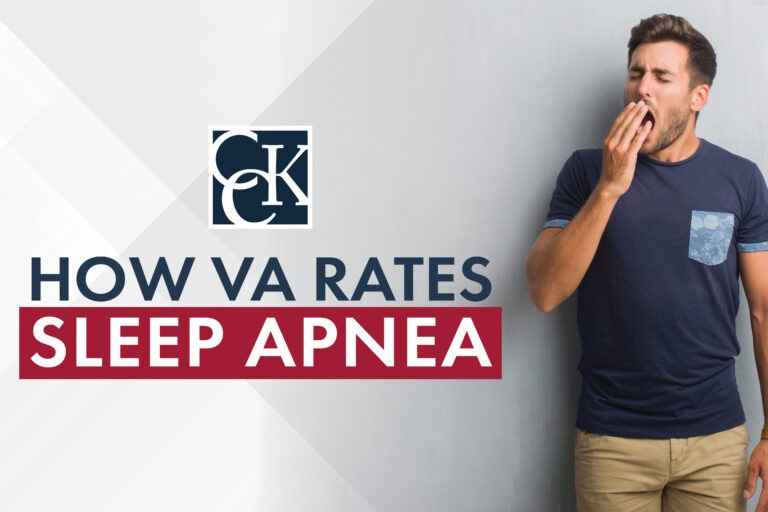How VA Rates Sleep Apnea

If you developed sleep apnea as a result of your military service, you could be eligible to receive disability benefits from the Department of Veterans Affairs (VA). But there are several potential challenges to winning claims for this condition, and many veterans receive denials after they apply.
In this article, we will discuss how VA goes about rating veterans with sleep apnea and some of the most relevant facts and issues that we encounter with these disability claims.
Types of Sleep Apnea and Symptoms
Sleep apnea is a serious condition that affects a person’s ability to breathe when they are sleeping. The three types are:
- Obstructive sleep apnea (OSA) — The most common form of this condition. If you have OSA, then the airflow into your lungs is disrupted due to an issue with your throat muscles.
- Central sleep apnea (CSA) — If you have CSA, then it means your brain is not sending the right signals to the muscles that control your breathing.
- Treatment-emergent central sleep apnea, or “complex sleep apnea” — Occurs when a person who suffers simultaneously from OSA and CSA. Also known as “mixed sleep apnea.”
Symptoms can include loud snoring, gasping for air while sleeping, difficulty remaining asleep (i.e., insomnia), irritability, dry mouth upon waking, and more. These symptoms can greatly impact your daily life, so treatment is necessary.
Treatment options typically include the use of a device called “CPAP,” or “continuous positive airway pressure.”
What Does It Mean for a Condition to be Service Connected?
Now, to win your VA disability claim, you must prove that your condition is service connected.

Only service-connected medical conditions are eligible for disability compensation. A service-connected condition is one that resulted from an in-service illness, injury, or event. This connection to service can be presumptive, direct, or secondary.
Direct Service Connection for Sleep Apnea
To prove a direct service connection, veterans must show evidence of the following:
- A current diagnosis of their condition, as confirmed by a sleep study;
- An in-service event, injury, or illness; and
- A medical nexus, or link, between their diagnosed condition and the in-service event, injury, or illness.
Veterans can prove service connection by showing that their sleep apnea began in service using service medical records, or by providing an opinion from a medical professional that shows a “nexus,” or a link, between their current diagnosis and signs or symptoms experienced in service.
VA requires that a sleep study be conducted before confirming a sleep apnea diagnosis. Even if a medical professional has previously diagnosed a veteran with this condition, VA will not consider this sufficient evidence without a sleep study.
Veterans who have already been granted VA disability for this condition based on their service connection but did not undergo a sleep study will likely be required to undergo one to maintain their benefits.
Secondary Service Connection and Sleep Apnea
There are also service-connected disabilities that can lead to sleep apnea after service. Veterans with these disabilities may be able to establish service connection for sleep apnea on a secondary basis. Establishing a secondary service connection involves proving that your sleep apnea is a secondary or residual effect of a service-connected condition.

To prove secondary service connection, you must provide a medical nexus opinion linking your current secondary condition to your already-service-connected disability. Examples of service-connected conditions that may lead to sleep apnea include chronic rhinitis, asthma, a deviated septum, or diabetes mellitus type 2.
Conversely, sleep apnea could cause a host of other disabilities. For example, this condition is associated with causing or worsening conditions like GERD, hypothyroidism, PTSD, and other mental health conditions such as depression and anxiety.
How Does the VA Evaluate Sleep Apnea?
The VA evaluates sleep apnea under 38 CFR § 4.97-13, Diagnostic Code 6847 — Sleep Apnea Syndromes (Obstructive, Central, Mixed).
Veterans are assigned a 0, 30, 50, or 100 percent sleep apnea VA rating based on the severity of their condition. The current VA disability rating criteria for sleep apnea are as follows:
- 100 percent — The veteran has chronic respiratory failure with carbon dioxide retention, requires a tracheostomy, or has cor pulmonale (i.e., the enlargement or failure of the right side of the heart due to lung disease.)
- 50 percent — The veteran requires the use of a breathing assistance device, such as a CPAP machine.
- 30 percent — The veteran is experiencing persistent daytime hypersomnolence (i.e., a condition characterized by chronic daytime sleepiness that does not improve even with sufficient sleep).
- 0 percent — The veteran has a documented sleep disorder, but their condition is currently asymptomatic (i.e., not producing symptoms). Although considered noncompensable, the veteran may still qualify for other benefits, such as VA health care.
As of December 1st, 2023 the VA disability rate benefit amounts are as follows:
A rating of at least 30 percent or higher qualifies you for additional compensation if you have a spouse, dependent children, or dependent parents living in your home.
VA Claim Denied? Call CCK for a Free Case Evaluation
Appealing a sleep apnea claim denial is a complex process. It is valid and understandable to become overwhelmed while handling a case on your own. If this happens to you, consider asking for help. The veterans and advocates at Chisholm Chisholm & Kilpatrick LTD have decades of experience successfully appealing thousands of cases.
If you filed a VA claim for sleep apnea but were denied, CCK may be able to help get you the benefits you deserve.
Call CCK today at (800) 544-9144 for a free case evaluation with a member of our team to see if we can assist.
Share this Post
